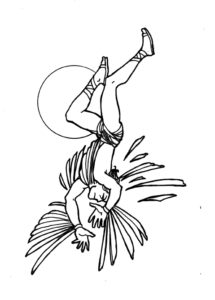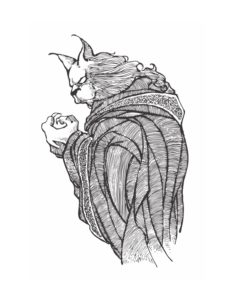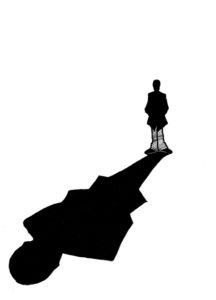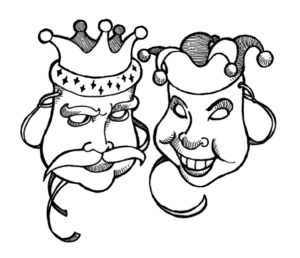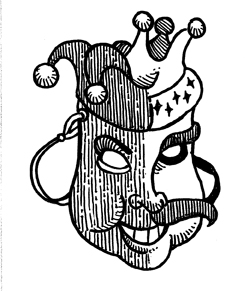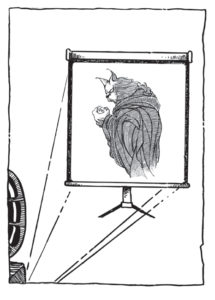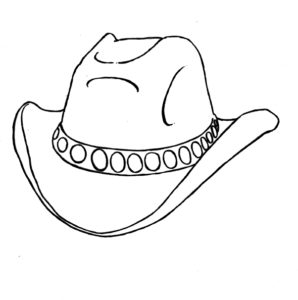What is the Human Shadow?
The following is taken from chapters 9 and 10 of a book called Shadow in the USA.
It can be downloaded, forwarded, printed, and/or otherwise shared
by clicking on the link at the beginning or the end.
The whole book can be downloaded, forwarded, printed, and/or otherwise shared @ shadowintheusa.com
Because we’re not just running out of time.
We’re running out of world.
The Personal Shadow
(Download a PDF of this text here)
The subconscious part of every human mind holds a whole cast of characters hanging around backstage, hoping to land a role. All the instinctual and archetypal characters from millions of years of evolution, the entire cast of myth, tale, and dream, stand around waiting in the wings of your psyche, just longing for a chance to appear onstage.
But we get typecast early on. We develop a certain role in our family-of-origin theater and then we continue to play that role when we go out onto the world stage. It’s actually a matter of survival. Children can’t make it on their own as infants. So to please the incomprehensibly demanding adults they depend upon, children learn to hide parts of themselves before they can walk. They learn the difference between approval and disapproval before they can talk. And unless shaken up by some sort of unforeseeable disaster—or a ton of therapy—human beings tend to go all through life playing a version of the role they first learned to play in childhood.
This role gradually becomes the ego, the face we present to the world, the way we think of ourselves, the way others think of us (we hope). And all the parts of the psyche that don’t fit neatly into this role, all those other instinctual actors milling around backstage in our subconscious, end up in our ego’s Shadow.
Carl Jung was one of the ‘big three’ fathers of modern psychology–Freud, Jung, Adler. He began to call the contents of the subconscious mind its “shadow” in the early 1900s. Jung also gave us the terms introvert, extrovert and complex, and he classified our basic psychological tendencies, which led to those personality tests that HR departments use today. Interesting guy. 70 percent scientist/50 percent mystic. And although his works can sound dated now –this guy could write in Latin, and use alchemical symbols as allegories– some of your work may sound dated, too, in another 100 years. There’s no denying his lasting impact on the field of psychology.
This particular concept, the Human Shadow, is where Jung began to branch away from Freud. Whereas Freud insisted that everything in the subconscious was about repressed sexuality (and perhaps a lot of it was, back in Freud’s day…) Jung said no, no, the subconscious holds whatever you don’t know about yourself, not just repressed sexuality, and particularly those things you really don’t like to admit about yourself.
So Jung was using the word “Shadow” to describe the parts of the psyche that a person doesn’t want to—usually just can’t—think about or acknowledge. It refers to the repressed, un-lived side of your normal daytime personality—the things you don’t like about yourself, the things you don’t want anyone else to know about you, the things that don’t fit neatly into your ego’s usual role.
Thus your Shadow will assuredly contain negative qualities, such as envy or prejudice or cruelty or false accusation. And it could even contain positive qualities, if you think of yourself as some sort of criminal bad ass. But these qualities, whatever they are, stay in your mind’s shadow because you don’t like to—in fact, most of the time you simply can’t—admit you possess them. Some parts of ourselves we like to show to others—put out into the light—and some parts of ourselves we like to hide—keep in the shadows.
Coming up with the word ‘Shadow’ for this phenomenon was a stroke of genius. It put a memorable label on a basic psychological process, and it is extremely apt symbolically. Neither the outside physical shadow nor the inner mental Shadow can be smelled or tasted or touched or felt, yet both are very firmly hooked to us, whether we like it or not, whether we can see them or not. And while other people can see your Shadow pretty easily, you’d have to turn your head around to be able to see your own Shadow.
There’s also a nifty irony built into both meanings of the word: whether it’s a shadow cast by light in the natural world, or a Shadow cast by your mind, the brighter the light, the darker the Shadow. Some of the most vile, most grotesque acts in history have been done—and are still being done right this very minute—in the name of God, which is the brightest light we’ve been able to imagine so far.
Ever noticed how often someone at the top of the heap—famous, wealthy, powerful—gets caught doing something ridiculously low-brow? How often celebrated evangelists or celibate priests become embroiled in sleazy sexual scandals? The brighter the light, the darker the shadow… The more wonderful you think you are, the more you have to hide.
The enchantments and bewitchments that occur over and over again in classic fairy tales point to those that happen in real life. In fact, most of us fall into an enchantment at one time or another. We glorify one type of role until we think that we are a good mother, or we are a hard working wage earner, and then we try very hard not to be anything else.
We just flat get stuck in our role—as athlete or honor student or class clown or thin woman or powerful businessman or laid back dude or devoted religious disciple—and deny the very existence of any part of ourselves that doesn’t fit neatly into that role. We deny we have any desire to skip class, or eat the whole bag of cookies, or blow off work today, or hop into bed with a total stranger, or scream loudly at our children.
And we usually can manage to cram all those contrary desires way down into our shadows. What contrary desires? I don’t see any. That is, until we wake up one day and find ourselves doing something really stupid and totally “out of character.”
Out of character… out of the role we’ve chosen—or were told—to play. Which was probably a fairy tale role, from an idealized family, and so not even humanly possible in the first place. It’s sad, poignant, and highly paradoxical that, despite the evil increasing exponentially around the world, most of us are trying really hard to be good.
There’s actually a correlation between trying hard to be good and an increase in evil. Denying parts of your personality on a daily basis is called repression, and it creates another ongoing problem called regression. If I can’t even admit I have certain feelings—if they shame me, or scare me, or if they’re not permitted in my culture—those feelings will not look the same when they eventually slip past my conscious guard. Those feelings will have regressed.
Re-gress is the opposite of pro-gress. To regress is “to go backwards.” That means the parts of myself I just can’t stand to think about will get less human the longer I refuse to think about them. The longer I pretend not to know anything at all about a basic instinctual impulse of mine, the grosser and hairier and wilder that abandoned part of myself is going to get, like a castaway living all alone on an island. Like that caveman lurking in your subconscious…
What makes a bunch of good ole boys who usually hang out down at the café go out and lynch a black man? Or beat a gay man to death and leave his body dangling from a barbed wire fence? Who does the actual torturing in torturous regimes, or beats women for wearing fingernail polish? Who carries an AR-15 into a grocery store or a school? Were these people all born evil?
Probably not. However, we are all capable of a distinct downward slide as we go through life… from repression to regression to aggression.
If we wish to appear angelic, the devil inside dances. When we become absolutely certain that our way is the only way, imps start to grin. Being right at all times and perfectly flawless is simply not possible for a human being. When everyone is wrong but you, you still have some growing up to do.
If we can’t admit making a mistake or losing at something… can’t discuss important issues calmly… when we simply won’t tolerate other points of view, much less change our minds when faced with new evidence… when we are obviously much cooler or smarter or more righteous, and everyone else is obviously lamer or dumber or down-right damned… that is just sheer self-enchantment, folks. In classic fairy tales, that’s how the siblings act who don’t find the treasure.
Luckily, there’s a sure-fire way to break this sort of ego-self-enchantment. It’s a fairly easy process once you get the hang of it, but step one must be performed while you are totally alone. 1) Stand in front of a mirror, look long and hard at your face, which is the mask you wear for the role you usually play, and then say out loud, “Aw, man. I am as full of shit as a clogged toilet!” 2) Keep that in mind while you go out for coffee, or walk down to the pub. 3) Repeat this process every few days.
If you do this correctly, while you’re out and about you’ll begin to notice that every person on earth—you, me, and that guy in the corner booth over there—is just as much Court Jester as they are Wise King, just as much Evil Stepmother as they are Snow White, and that the easiest way forward for the entire human race would be for all of us to go ahead and start admitting that fact.
None of us are perfect! All of us have flaws! And the sooner we can own up to that, the sooner we can get to mending our mistakes.
“Like Dorian in The Picture of Dorian Gray, we each seek to present a beautiful, innocent face to the world; a kind, courteous demeanor; a youthful, intelligent image. And so, unknowingly but inevitably, we push away those qualities that do not fit the image, that do not enhance our self-esteem and make us stand proud but, instead, bring us shame and make us feel small. We shove into the dark cavern of the unconscious those feelings that make us feel uneasy, thereby creating shadow content.” –Connie Zweig and Steve Wolf, Romancing the Shadow
“Sin is nothing more and nothing less that a failure to be continually perfect. Because it is impossible for us to be continually perfect, we are all sinners… Be perfectly honest with yourself, and you will realize that you sin. If you do not realize it, then you are not being perfectly honest with yourself, which is itself a sin. It is inescapable: we are all sinners… Those who have ‘crossed over the line’ [into evil] are characterized by their absolute refusal to tolerate the sense of their own sinfulness.” –M. Scott Peck, from “Healing Human Evil,” in Meeting the Shadow
How the Personal Shadow
Fits Into the Collective Shadow
Whatever you have in your Shadow is in there because it’s a part of you. You don’t want to think about it, that’s why it’s hidden in your Shadow, but it’s still a part of you. Which means it has to, it will, show up somewhere in your life. It is not possible to eliminate parts of yourself by simply ignoring their existence.
So if there are some things you can’t stand to admit about yourself, if you just can’t face some of your own stuff, then you’re going to see your own stuff on someone else’s face.
It will not just disappear. It will not simply give up and go away because you refuse to own it. No indeed! It will start appearing in other people. You’ll see it in this person and in that person. It will keep popping up in others again and again, and all those other people doing whatever it is you don’t like about yourself will look worse and worse to you as time goes on.
“Hate has a lot in common with love, chiefly with that self-transcending aspect of love, the fixation on others, the dependence on them, and in fact the delegation of a piece of one’s own identity to them… the hater longs for the object of his hatred.”–Vaclav Havel, from The Shadow in America
Humph. Kind of explains why we hear so much ranting and raving over the airways, doesn’t it? And why it’s so easy to get all hot and bothered about what other people are doing… why we just can’t seem to get off of certain subjects…
“Consider the convenience of knowing who the enemy is, always. If the enemy is out there, they are not in here, so I have no burden of consciousness, no obligation of self-examination.”–James Hollis, Why Good People Do Bad Things
The psychological process involved here is childishly simple: we dwell on what others are doing to keep from seeing what we’ve been up to ourselves.
This is called projection, in psychological terms, and it happens all the time. It starts with denial, and it ends in blame. We take some part of ourselves we don’t like—or are ashamed of, or don’t want to think about, or can’t bring ourselves to deal with—and then project it out onto another person where we can see it, and blame them, vehemently, for being that way.
This is not a new idea. Every spiritual discipline in history talks about it. Jesus chided his followers about pointing out littlenspecks of dirt in other people’s eyes while failing to see whole logs in their own. We all grew up hearing “That’s the pot calling the kettle black!” or “Takes one to know one!” or “People who live in glass houses shouldn’t throw stones!” We all know something, vaguely, about how the cycle of denial, projection and blame works.
What we haven’t yet come to grips with is how prevalent and malevolent this simple ego defense mechanism has become.
“If we do not see our own shadow, we project it onto other people, who then have a fascinating effect on us. We are compelled to think about them all the time; we get disproportionately stirred up about them and may even start to persecute them. This does not mean that certain people whom we hate are not in truth intolerable; but even in such cases we could deal with them in a reasonable manner or avoid them–if they were not the projection of our shadow, which never fails to lead us into every possible exaggeration and fascination.”–Marie-Louise von Franz, Archetypal Dimensions of the Psyche
Imagine a movie projector. You mind would be the machine whirring away in that little room up at the back of the theater, and the other person would be the big screen down in front. You’re creating the image, the image is actually being produced inside your head, but the other person is the only place where you can actually see that image. You’re projecting that image onto another person.
This process allows us to accuse others of having qualities we abhor in ourselves, while remaining steadfastly in love with ourselves and not having to change a thing personally. “I don’t have a bad temper. What are you talking about, you asshole? YOU have a TERRIBLE temper!!*#%*!!”
“A predominant behavior characteristic of those I would call evil is scapegoating. Because in their hearts they consider themselves above reproach, they must lash out at anyone who does reproach them. They sacrifice others to preserve their image of self-perfection… Since deep down they feel themselves to be faultless, it is inevitable that when they are in conflict with the world they will perceive the conflict as the world’s fault. Since they must deny their own badness, they must perceive others as bad. They project their own evil onto the world. They never think of themselves as evil; on the other hand, they consequently see much evil in others.”–M. Scott Peck, from “Healing Human Evil,” in Meeting the Shadow
And this is where it gets serious. I’m sure you’ve heard that Denial ain’t just a river in Egypt. Well, Projection and Blame ain’t just small towns in Texas. We are not talking about a quaint practice only carried out by a few remote primitives somewhere on the other side of the planet. This cycle—denial, projection, and blame—is a basic psychological defense mechanism. It’s a description of what went on at your dinner table last night. It’s a description of what we each do all day long, every day, unless we’re making a sincere effort not to do so, and probably a good 78.87% of the time even then.
There’s no getting around the fact that human beings are now using their intelligence to project whatever they don’t like about themselves onto other people, rather than using their intelligence to correct whatever it is about themselves they don’t like. Shoot—we’re taught to project whatever we don’t like about ourselves onto other people. Children hear their parents, civic leaders and sports stars do it every day.
Try looking around for someone who’s projecting their own Shadow material onto someone else. (Blaming others for what they’ve done themselves, or accusing others for qualities they would never admit to in themselves.) It will not take you long to find it—in history, in current politics, in the news, at sporting events, on the internet, on television, in your own home, and in your own heart. Nor will it take you long to come to the conclusion that this is not some harmless procedure easily overlooked among friends. This is killing us.
As Robert Bly put it,
“Projection of shadow material causes most of the misery, injustice and warfare in the world.”
And as Carl Jung wrote,
“Learning to integrate shadow material is the single most important task facing mankind, as failure to do so will lead to the extinction of the human race.”
Whoa. What? Extinction of the human race? Why’d he say that? He said that because we don’t just project blame individually. We also project blame collectively.
The really dire news is:
WHOLE CULTURES CAST SHADOWS
A hat that looks really cool in a bar in Wyoming may not look cool at all on Fifth Avenue in New York. There are substantial cultural differences between the Pacific Northwest and the Deep South. Between being German and being Sudanese. Between Chinese and Chilean. We’re not just ‘stuck’ in ego roles and family roles; we’re stuck in social-historical-mythological eras and areas.
And then, in practice, we refine our differences even further by only hanging out with people inside our era and area who are the most like us. Red State, Blue State.
As history has shown over and over again, if enough people deny the same qualities in themselves and then project those qualities out onto other groups of people, something really nasty occurs: like witch burning crazes, or exterminations of native populations, or institutionalized slavery, or civil wars, or Holocausts, or genocide. Massive acts of evil simply could not be perpetrated without massive amounts of denial, projection, and blame.
You can think of the Human Shadow as layered, or tiered: there are personal layers, and then there are collective layers. We each have Personal Shadows that can get out of hand: for example, we tend to make fun of how other people look if we feel insecure about our own attractiveness. And then we each belong to Collective Shadows that can get out of hand: we will accuse another group of evil if we can’t bear to look at the evil our own group has done, or is doing.
An excellent example of the latter occurred in US history at the end of WWII. The saturation bombing of German cities by British and US forces culminated in a firestorm at Dresden so fierce that people hiding in underground bomb shelters melted into liquid sludge. Then the USA dropped two atomic bombs on Japan.
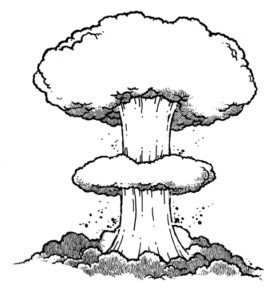 At Hiroshima and Nagasaki 199,000 people were either killed instantly or died later, slowly and hideously, from radiation poisoning. These three events –Dresden, Nagasaki, Hiroshima– killed what historians now estimate to be 224,000 people, and not soldiers, either. These were completely innocent civilians who had been going about their business in big cities. It’s just gruesome. Ghastly. Way, way beyond what gruesome or ghastly or any other word could possible convey.
At Hiroshima and Nagasaki 199,000 people were either killed instantly or died later, slowly and hideously, from radiation poisoning. These three events –Dresden, Nagasaki, Hiroshima– killed what historians now estimate to be 224,000 people, and not soldiers, either. These were completely innocent civilians who had been going about their business in big cities. It’s just gruesome. Ghastly. Way, way beyond what gruesome or ghastly or any other word could possible convey.
So very soon after these events, unable and unwilling to comprehend that such colossal evil could be perpetrated by their own country, citizens all over the USA (spurred on by their leaders), began to obsess about how evil Russia was, and to build bomb shelters in their backyards in case of a Russian nuclear attack.
I grew up with one of those bomb shelters in my backyard. I also grew up hearing stories and seeing lots of movies about how badly German and Japanese soldiers acted during WWII. The 224,000 civilians slaughtered by the US and its Allies at Dresden and Hiroshima and Nagasaki were simply not mentioned during my childhood, in the USA, during the 1950s. Not by anyone. We were too busy hiding under our school desks during air raid drills because we’d been told that the Russians were Commie bad guys who were out to get us.
In other words, there is a ‘me against you’ aspect to the Personal Shadow, and there is an ‘us against them’ aspect to the Collective Shadow. And projected out onto others, both types of shadow material can do colossal amounts of harm.
“The collective shadow can take form as mass phenomena in which entire nations become possessed… When a minority is forced to carry the projections of a majority, the potential for great evil is activated.”–Connie Zwieg and Jeremiah Abrams, Meeting the Shadow
Politicians use symbols and symbolic language to manipulate their populaces because symbols and symbolic language stimulate the subconscious, they pull the heart-strings to our collective Shadow ties. And we tend to fall for it because we each have to belong to something bigger than ourselves to make it on this planet, and the scarier this planet gets, the more we subconsciously hope that whatever we belong to is really powerful. Mighty. Right. Beyond reproach.
So we all respond heartily—no thinking required—to waving flags, national anthems, simple catchy slogans, matching clothing, or links to the past through the use of archetypal words like ‘fatherland’ or ‘motherland’ or ‘homeland.’
Hitler was a consummate master of the symbol. The salute, the swastika, the rows upon rows of clean uniformed youths singing and marching in step… symbols like these speak directly to our need to belong to, and to be protected by, something bigger than ourselves—a need that lives in every human heart.
“Groups always have a fluid, amorphous but highly vulnerable group “ego”… Moreover, that fluid, amorphous group ego is always highly susceptible to the manipulation of a charismatic leader… Charismatic madness touches and activates the “mad parts” in otherwise quite sane people. Psychological contagions, Shadow plagues, do occur, and few of us, if any, are exempt.”–James Hollis, Why Good People Do Bad Things
Of course political examples of the Collective Shadow abound today, but we’re going to look at rather old examples, on purpose. Current events would be way too divisive. But let’s make it very clear, here. We are not just talking about Republicans or Democrats, and we are not just talking about the USA. We’re talking about how the Shadow side of human nature operates at a national, collective level. My examples are from the USA because that’s my country and what my country does matters to me. But if you look into any other country’s history, you’ll find the same sorts of things.
We’d all like to believe the surface version of the fairy tale. We’d all love to live without guilt in the home of the free and the brave. But projecting Shadow material on a national level is serious, deadly business. No matter which state we live in or what party we belong to, if we don’t start looking truthfully at the past and dealing honestly with the present, if we don’t stop muddying the waters with denial, projection and blame, and start taking clear-eyed responsibility for our actions, we are not going to get through the next few decades unscathed. Nor will the rest of the world.
So. Some historical examples of the Collective Shadow. In a 2002 “State of the Union” address, the President of the United States called three other countries an “axis of evil” for “selling arms to enemies” and “fostering terrorism.” Really read them the riot act, in a very rousing way.
O…K… but… what was ‘Iran-Contra’? Wasn’t that when the USA sold arms to a country that was actually holding US citizens hostage at the time (Iran). And then didn’t the USA use the profits from those covert, illegal sales to train and finance a guerilla army (the Contras) in order to overthrow a democratically elected government in Nicaragua? Yes, it was. That is exactly what ‘Iran-Contra’ means.
Do you see how this works? You sell arms to enemies and foster terrorism yourself, then you accuse other countries of “selling arms to enemies” and “fostering terrorism” to divert attention from your own crimes. The best defense is always a good offense.
This is a classic example of ‘the pot calling the kettle black’ at a national level. It’s like name calling on the playground, except with far deadlier ammo. And while it does let off a little saber-rattling steam and allow the USA to feel superior at the moment, belittling other governments will not solve a single problem here at home. It will not provide universal health coverage, balance the budget, adequately fund teachers and education, curtail environmental degradation, hold corporations accountable to their cultures, lower our dependence on fossil fuels, or index the minimum wage to the cost of living.
Nope. That’s one of the problems with slinging shadow material around at a national level. It doesn’t get a damn thing done at home. It’s just sheer subterfuge. But... the more we self-righteously puff ourselves up and accuse others of evil-doing, the more we can get away with ourselves. This is what George Orwell meant by “doublethink” and “newspeak” in his famous novel 1984.
DOUBLETHINK: was used to train the populace to be able to hold two obviously contradicting facts as equally true.“The Party told you to reject the evidence of your own eyes and ears. It was their final, most essential command.” (Today we call this cognitive dissonance.)
Doublethink was used in conjunction with NEWSPEAK: this was a language with limited vocabulary and restricted grammar designed to prevent freedom of thought by reducing complex ideas to simplistic jingos. “The intention was to make everyday speech as nearly as possible devoid of thought.”
This same President later gave a speech in Tbilisi, Georgia, about the glories of freedom and democracy, which was broadcast live. Everyone listening heard a homey, heart warming, cliché-filled, archetype-stirring speech. Very noble. Very presidential. It would have been impossible to disagree with a word the man said: …who doesn’t love freedom, or want to practice democracy? And the whole speech was doublethink and newspeak. Astoundingly so.
The man had not been democratically elected himself, as everyone knew. He actually lost his election, but was placed in office before all the votes in Florida could be counted by judges his father appointed to the Supreme Court, with the help of his brother’s State Election Officials.
The day he gave this laudable speech in Tbilisi about the glories of freedom and democracy, his administration was actively engaged in demolishing a weaker country’s sovereign government (Iraq). In defiance of world opinion. For reasons that turned out not to exist. It caused bloody chaos in that country, of course, and turned a budget that was balanced when he took office into a cripplingly huge federal deficit from which our country may never, ever recover. And, guess what? The political party this President belongs to has specialized in accusing the other party of being big spenders, ever since, at every opportunity. The best defense is a good offense.
So—what was this president doing when he used the words “freedom” and “democracy” over and over in a speech? Doublethink. Trying to fool the rest of us? Newspeak. Trying to convince himself? Denial.
The political rhetoric that we hear day in and day out neatly emphasizes our nobility, but it conveniently leaves out our Shadow.
And while it is slightly understandable that we swallow whatever we hear from our leaders without question—because we want our country to be right, we want our favorite talk-show hosts to be right, we want our party to be right, and because we can be very good at ignoring all evidence to the contrary—while it is slightly understandable that we swallow whatever we hear from our leaders without question, that does not make it smart.
Ancient Greek dramatists used the word ‘hubris’ to mean a great, overweening, invincible-feeling pride that invariably causes its own downfall. Hindus and Buddhists use the word ‘karma’—you will experience the type of actions that you commit. Christians say: “As ye sow, so shall ye reap.” In the 1960s hippies used to say, “What goes around comes around, man.”
Put it any way you want. The point’s the same: any country –any group of people– who cannot admit mistakes, and would rather blame the evil they do on others than change their own evil behavior, is going to pay an astronomical price in the long run.
And judging from the number of serious problems the USA faces—never-ending wars, enormous federal deficits, underfunded educational systems (with no system whatsoever for the youngest among us), crumbling infrastructures, rising poverty and mortality rates, disappearing middle class jobs, steadily worsening weather due to unaddressed climate change, lakes and oceans full of pollution and plastic, chronic racism and sexism, truly bizarre mass shootings, and political parties that cling to power by lying and obstructing rather than governing—judging by all of this, it’s safe to say that we have already entered “payback” stage, and that it is indeed a bitch.
Projection dominates our interactions because it’s easier to accuse others of wrongdoing than it is to admit the wrong we’ve done ourselves. It’s so much easier to attack others than it is to change.
Personally or collectively.
So we go for the surface interpretation of the fairy tale. We see ourselves as the good guys and all those other guys as the bad guys, who deserve whatever they get.
We tell ourselves that all the monsters are on the outside.
But the real monsters are on the inside.
Personally and collectively.
Which makes them hard to see.
“It is only when we have the courage to face things exactly as they are, without any self-deception or illusion,
that a light will develop out of events by which the path to success may be realized.”
—I Ching
“The only devils in the world are those running around in our own hearts. That is where the battle should be fought.”
—Mahatma Gandhi
“The task of confronting the brutal, destructive elements of the Shadow has become the inescapable destiny of our species: if we fail, we cannot hope to survive.”
—John A. Sanford, Evil, The Shadow Side of Reality
The above was taken from the 9th and 10th chapters of a book called Shadow in the USA.
This excerpt, and that entire book, are both available as free pdfs at shadowintheusa.com
Because we’re not just running out of time.
We’re running out of world.
Written by Kay Newell Plumb
Illustrated by Bob Hobbs
Website by Tim Plumb
Read. Share. Discuss.
Download a PDF of this text here.
